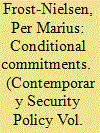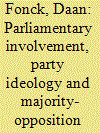| Srl | Item |
| 1 |
ID:
156086


|
|
|
|
|
| Summary/Abstract |
Why do states make substantial military contributions to coalition operations, while at the same time apply reservations, or caveats, to how the coalition can use the military contributions? Caveats rose to prominence in defense and policy circles with NATO’s campaign in Afghanistan. In the scholarly security literature, the term remains a buzzword for all types of reserved efforts by states in coalition warfare, but there are few theoretical accounts addressing caveats. This article contributes to the knowledge gap on caveats through a comparative case study of Denmark’s, the Netherlands’, and Norway’s contributions to NATO’s intervention in Libya in 2011. It demonstrates that caveats can occur through three different causal pathways: compromises from domestic bargaining, handling of alliance commitments, and implementation and civil–military relations. Insights into the complexity that causes caveats are highly relevant for both political and military decision-makers that are trying to coordinate states’ effort in coalition operations.
|
|
|
|
|
|
|
|
|
|
|
|
|
|
|
|
| 2 |
ID:
166606


|
|
|
|
|
| Summary/Abstract |
This article examines the impact of parliamentary involvement in troop deployment decisions on restrictions on military mandates by examining the Belgian contribution to the 2011 Libya intervention and the coalition against the self-proclaimed Islamic State. More specifically, we analyse (1) the effect of party ideology on mandate preferences, and (2) the impact of bargaining between majority and opposition parties on the outcome of mandate negotiations. Our case study demonstrates that left-wing parties show a strong inclination toward imposing restrictions on the use of military force beyond humanitarian goals, while right-wing preferences tend to depend on the national interests at stake in the operation. With regard to majority-opposition bargaining, our study shows that the impact of opposition parties is dependent on the degree of contention between government and opposition parties, as well as on the extent to which the executive needs to seek support across its own majority.
|
|
|
|
|
|
|
|
|
|
|
|
|
|
|
|